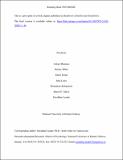| dc.contributor.author | Mannion, Arlene | |
| dc.contributor.author | White, Keeley | |
| dc.contributor.author | Porter, Emily | |
| dc.contributor.author | Louw, Julia | |
| dc.contributor.author | Kirkpatrick, Bernadette | |
| dc.contributor.author | Gilroy, Shawn P. | |
| dc.contributor.author | Leader, Geraldine | |
| dc.date.accessioned | 2019-09-23T14:58:05Z | |
| dc.date.issued | 2019-09-04 | |
| dc.identifier.citation | Mannion, A., White, K., Porter, E., Louw, J., Kirkpatrick, B., Gilroy, S.P., & Leader, G. (2019) 'Psychosis' In: J.L. Matson(Eds.). Handbook of Intellectual Disabilities. Cham : Springer. | en_IE |
| dc.identifier.isbn | 978-3-030-20843-1 | |
| dc.identifier.uri | http://hdl.handle.net/10379/15454 | |
| dc.description.abstract | Psychosis is a set of symptoms related to mental health issues that occurs in a range of psychotic disorders. Psychosis in individuals with intellectual disabilities is an underexplored area in research. This chapter provides an overview of psychosis in intellectual disability (ID). Definitions of what psychosis is will be discussed, as well the prevalence and incidence of psychosis. The importance of studying psychosis in ID will be outlined, including a discussion of the difficulties of providing a diagnosis of psychosis in individuals with an ID. Difficulties of diagnosis will be discussed in terms of diagnostic systems and assessment tools, presence of dual diagnosis, similarities in the etiology of challenging behavior and psychiatric disorder, severity of challenging behavior, the level and degree of intellectual disability, and difficulties in self-report. Risk factors of psychosis will be examined, including baseline risks, early-life risks, childhood risks, and risks later in life. Assessment of psychosis will be outlined, including recommendations for the assessment of psychosis in individuals with intellectual disabilities. Pharmacological and psychological treatment of psychosis in ID will be discussed including recommendations for treatment. Finally, future directions for research will be outlined. | en_IE |
| dc.format | application/pdf | en_IE |
| dc.language.iso | en | en_IE |
| dc.publisher | Springer, Cham | en_IE |
| dc.relation.ispartof | Handbook of Intellectual Disabilities | en |
| dc.rights | Attribution-NonCommercial-NoDerivs 3.0 Ireland | |
| dc.rights.uri | https://creativecommons.org/licenses/by-nc-nd/3.0/ie/ | |
| dc.subject | Psychosis | en_IE |
| dc.subject | Intellectual Disability | en_IE |
| dc.subject | Risk Factors | en_IE |
| dc.subject | Prevalence | en_IE |
| dc.subject | Treatment | en_IE |
| dc.subject | Pharmacological | en_IE |
| dc.subject | Psychological | en_IE |
| dc.title | Psychosis | en_IE |
| dc.type | Book chapter | en_IE |
| dc.date.updated | 2019-09-23T14:37:15Z | |
| dc.identifier.doi | 10.1007/978-3-030-20843-1_46 | |
| dc.local.publishedsource | https://doi.org/10.1007/978-3-030-20843-1_46 | en_IE |
| dc.description.peer-reviewed | Not peer reviewed | |
| dc.description.embargo | 2021-09-04 | |
| dc.internal.rssid | 17767857 | |
| dc.local.contact | Arlene Mannion, Irish Centre For Autism, & Neurodevelopment Research, School Of Psychology, Nui Galway. Email: arlene.mannion@nuigalway.ie | |
| dc.local.copyrightchecked | Yes | |
| dc.local.version | ACCEPTED | |
| nui.item.downloads | 90 | |


